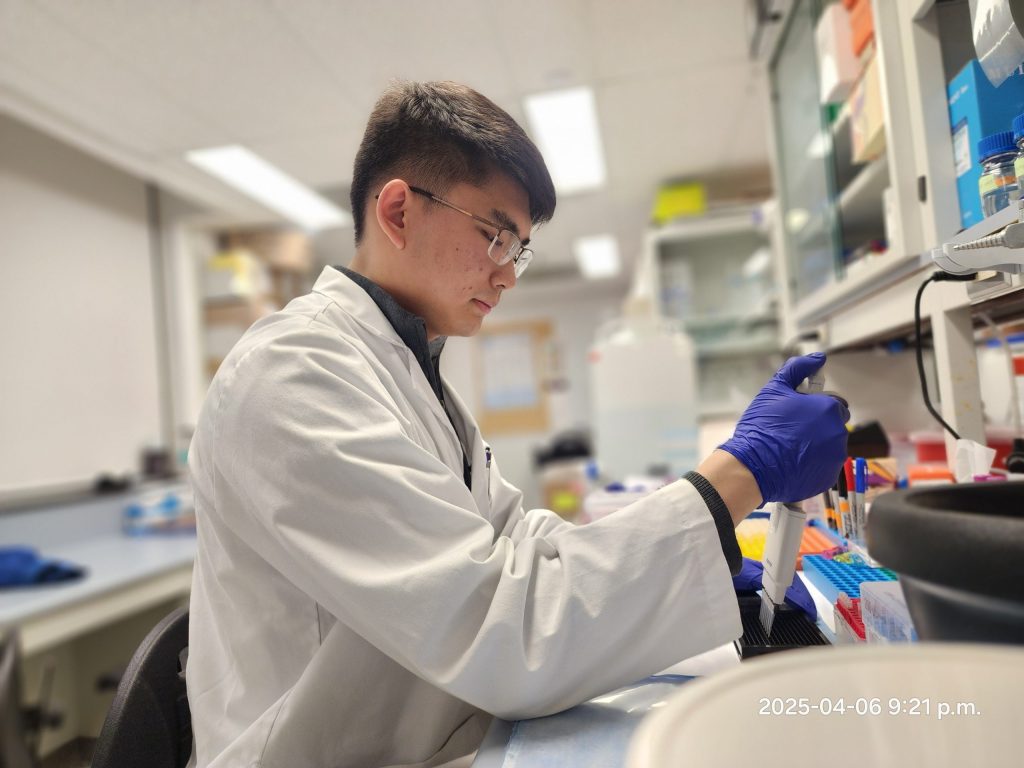George Xie is a PhD student in the Department of Biochemistry at Western University. He is conducting BCC-funded breast cancer research under the mentorship of Dr. Kun Ping Lu.
1. What specific areas of breast cancer research are you currently focusing on, and why are they important?
Currently, a major obstacle in breast cancer treatment is the occurrence of drug resistance. This means that patients must switch to different treatment strategies, or it may leave some patients out of options. Our lab has shown that a critical protein called Pin1 promotes many aspects of breast cancer, including promoting resistance to current breast cancer therapies. Importantly, we have shown that by inhibiting Pin1, breast cancer tumours can lose their drug resistance, allowing therapies to be effective again. My research focuses on developing novel inhibitors for Pin1 that are more potent and specific than previously identified drugs. My goal is for our Pin1 inhibitors to enter clinical use and offer a new therapeutic approach to patients with drug-resistant breast cancer.
2. What recent breakthroughs or discoveries in Canadian breast cancer research are exciting to you?
One recent discovery that I find exciting is the finding that a protein called CLIC3 promotes the spread of breast cancer into other organs and tissues. This process, called metastasis, is also a major barrier to curing breast cancer. Researchers in Saskatchewan are now working on a drug to inhibit CLIC3 and prevent metastasis of breast cancer. It’s exciting to see that like my project, there are new targets for breast cancer being discovered, and new drugs being developed that can address the largest challenges currently faced in breast cancer therapy.
3. How do you see the future of breast cancer prevention, screening, diagnosis, treatment evolving through research?
Thanks to the tireless work of researchers all over Canada and around the world, I see a bright future for breast cancer prevention, screening, diagnosis, and treatment. Genetic research has made huge advancements in understanding the genetic risk of breast cancer, and novel work on breast cancer vaccines may offer effective prevention methods for women who are at risk. Early detection and diagnosis methods have also allowed us to find and treat breast cancer at early stages, and novel treatment methods and strategies are continuously being investigated to increase efficacy and overcome drug resistance.
4. What advice do you have for young individuals interested in pursuing a career in breast cancer research?
Never stop being curious. Although we are closer than ever before to ending breast cancer, there are still many unanswered questions about how the disease develops and spreads, and how we can effectively treat it. By staying curious and open minded, we can continue to learn more about breast cancer, answer new questions that no one has ever asked before, and discover new ways to fight the disease.
5. What message would you like to share with someone who has just been diagnosed with breast cancer?
Although it can certainly be stressful and frightening to be diagnosed with breast cancer, there are teams of scientists all over Canada, and worldwide who are working endlessly on advancing breast cancer research. In the last few decades, exponential progress has been made in breast cancer therapy and by continuing to learn more about the disease, we continue to get closer to ending it.
View George’s video message:



















